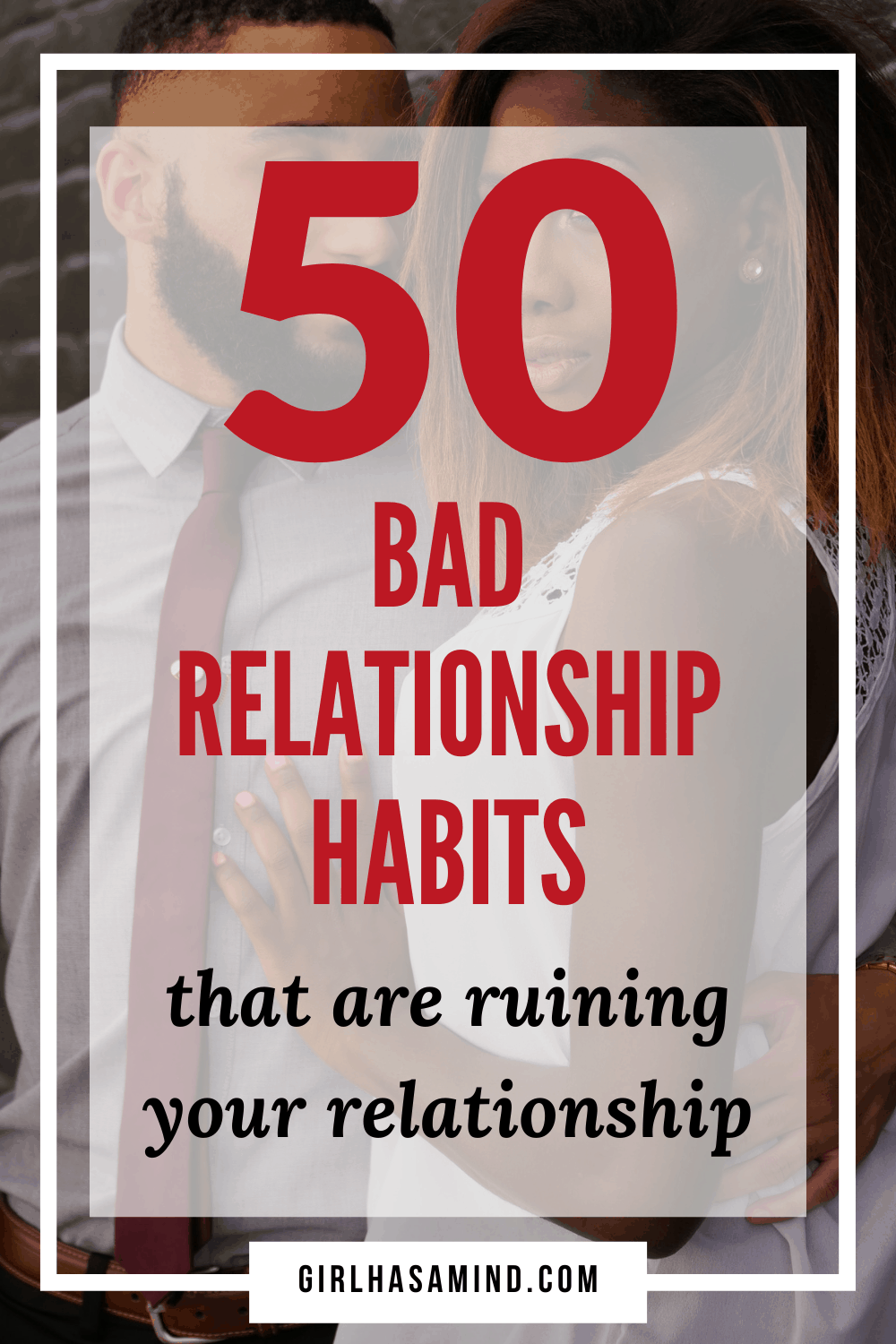50 bad relationship habits that people find romantic but are toxic and dangerous. #19 will surprise you.
In many ways, a lot of behavior we see in movies, which we have come to associate with romance, is actually very toxic.
It might seem cute to have a vampire watch you sleep, but in reality, it’s just creepy.
Movies have also made us believe that jealousy is a sign of true love, or that if you love someone, you should be able to forgive them no matter what, that no matter what happens, it’s never enough, or too much.
In the movie The Mexican, with Julia Roberts and Brad Pitt, the following question is asked “When two people love each other, really love each other, but they just can’t get it together, when do you get to that point where enough is enough?”.
In the movie, obviously, the answer is that there is no point where enough is enough.
But in real life that would be an example of a toxic relationship.
We all have that one friend who is in a very toxic relationship but won’t leave because she/he “loves the other person”.
Love should not be unconditional, and it shouldn’t be at the expense of one person.
A healthy and happy relationship requires trust and respect, of each other, as well as ourselves.
Related Posts

Here are 50 Bad Habits In Romantic Relationships
1. Making your partner your entire world
It may sound romantic, but in reality you are putting a lot of responsibility and expectation on one person.
Not only is it unhealthy to give up your own friends or spending time doing things you enjoy, but you are smothering your partner with your constant demand for attention.
I see this quite often when one person is looking to be “saved” or “rescued”. It’s an unfair burden on the other person.
2. Not spending time with your friends
Not spending time with your friends is a red flag that you are being sucked into a bad relationship, or falling into bad or negative patterns.
While it’s natural to want to spend as much time as possible with someone at the beginning when you are madly in love and totally infatuated, at some point it should ease off and you should return to a more balanced lifestyle that includes your friends.
3. Trying to change someone – or treat them like a project to help/save them
Surprisingly, we all wish that other people would accept us exactly the way we are, warts and all, as the expression goes.
I say surprisingly, because so few of us realise that.
When someone is constantly trying to change you, telling you how to act, behave, what to say, how to stand, what to wear, etc, we can’t help but feel this person doesn’t really love us just the way we are.
In healthy relationships, both partners accept that each has faults or quirks, and that’s OK.
4. Always paying for everything
As a woman I will say this for all the men out there: It is not your job to financially support a woman in this day and age.
While it’s OK to pay for meals and so forth when you are starting to date, and you earn more than her, it’s not OK to pay for everything all the time.
Certainly there are couples who do enjoy that dynamic where the man pays for everything and the woman sits around looking pretty, it can quickly become a point of contention that will lead to one person taking advantage of the other.
For all the women: Never rely on a man to pay your way. Every woman ever who got divorced wishes she had her own money, or feels she is getting screwed over by her ex husband and his new girlfriend. Always make sure you earn your own money.
5. Moving in together after a few weeks
Ah that first glow of infatuation! When the other person can’t do anything wrong and all their jokes are still funny.
Here’s the thing, when we are in the early stages of infatuation, we are incapable of spotting the red flags and danger signs that a person is not good for us. We are literally blind to their faults, there is nothing that they can do that is irritating.
But that eventually changes. Suddenly the fact they don’t put the cap back on the toothpaste tube is annoying and drives you crazy. Or the way they chew, or leave their wet towel on the floor.
But now you are living together and you are fighting all the time and the only way to get out of the joint lease is to ask your parents for money.
If only you had waited 6 months.

6. Compromising too much
Compromise is part of what makes a healthy relationship. But some people compromise too much, they give up too much of their own lives, dreams and desires.
If you don’t do anything about it, resentment will build inside you and you will feel more and more invisible and insignificant.
A healthy relationship requires balance in all things.
7. Refusing to compromise
On the flip side of that is when one partner doesn’t compromise enough, forcing the other person to bend more and more to make the relationship work.
This is particularly a problem with narcissists, but to be honest, anyone can be guilty of this.
8. Having unrealistic expectations of a partner
Perhaps one to blame on unrealistically romantic movies, or social media, but some people are prone to having these incredibly unrealistic expectations of their partner.
They think or feel that if someone really loved them that love would be expressed in certain behaviors.
For example, expecting your partner to bring you flowers once a week. Or always have dinner ready when you get home.
Other examples include expectations on how to dress, how to talk, expecting your partner to drop everything at a moment’s notice and be available for emotional support regardless of what is going on in their lives.
A lot of teenage romance novels and movies live in this unrealistic fantasy land. You just have to look at the Vampire Diaries to see how unrealistic the relationship between Stefan, Damon and Elena is. Their entire lives revolve around her and what she wants, whenever she wants it.
It’s the perfect example of a toxic relationship.
9. Idealizing your partner
Similar to above, but this is when you don’t see your partner’s faults or flaws because you are looking at them through rose-colored glasses. It’s as if they are the most perfect human being in the world.
This is often a result of a low self-esteem, where one person “looks up” to the other person.
This creates an unbalanced relationship, and is another example on the list of toxic relationships.
10. Using fear as a motivator
Some people resort to holding the relationship hostage by threatening to leave if the other person behaves in a certain way they dislike.
For example, threatening to leave if the other person ever picks up weight, or ever speaks to their ex.
Healthy and happy relationships are based on trust and respect, and threatening behavior is not a healthy way to deal with a problem in your relationship.
11. Trying to be/create the perfect couple
Sometimes one or both partners try to appear to be this perfect couple. I suspect the rise of the social media power couple has made this behavior worse, although it has existed prior to social media.
Kim and Kanye, Beyonce and Jay-Z, Ben and Jen….they all embody the appearance of this perfect couple.
I suppose we all wish we could be a power couple with lots of money, a dream life, being able to travel anywhere and everywhere in a private jet, and be envied and admired by those around us.
But remember, these are just appearances. You don’t know what is going on in someone’s relationship or marriage. You have no idea if these power couples are happy or not, and judging by the rumour mills and gossip columns, these couples have problems making their relationships work just like the rest of us.
There are no perfect couples. The closest you can get to it is by building a respectful, trusting and kind relationship where both partners feel happy, satisfied, and have the support to achieve their dreams and goals.

12. Oversharing on social media
A side effect on the above. Trying to convince the world about how great your relationship is and how happy you are by constantly sharing your relationship on social media.
While there is nothing wrong with sharing, if you are constantly posting on how perfect your relationship is, or how perfect your partner is, you are either trying to convince yourself, or you are making this person your entire life.
Neither of those are part of a healthy relationship.
13. Playing psychological games
Some people read too many of those dating books, or follow some of those dating experts on social media, who give advice on how to play hard to get to attract someone, or pretend to be unavailable simply to keep the other person on their toes.
While I admit the dating game (and I hate using the word game) can be difficult, in relationships you should aim for open communication, respect and trust.
14. Using the silent treatment
The ultimate psychological game, the silent treatment!
Anyone who has been on the receiving end of this understands how awful the whole thing makes you feel.
Plus you are powerless, you have to wait for the other person to “get over it”.
Problems should be talked about. Don’t wait for your emotions to run away from you, when something happens that makes you unhappy, speak out immediately. Don’t make an issue out of it, don’t let the drama spin out of control.
Simply say calmly but firmly that this makes you unhappy and that you would like your partner to stop doing it.
The sad thing is, when someone plays the silent treatment card, all it achieves is to drive the other person away. You are effectively punishing yourself, and damaging your relationship severely.
It’s hard to trust and respect someone who has just put you through the trauma of not speaking to you.
So if you are someone who does this to your partner, I suggest you find a way to work on this so you can stop doing it, I promise you it will bring you 2 closer together.
15. Avoiding conflict
While the silent treatment is one way some people deal with unpleasant situations, or emotions, avoiding conflict is not always healthy.
First of all, conflict does not mean fighting!
It’s OK to disagree with someone, and it’s entirely possible to do so respectfully. And it can be done without the whole thing leading to rejection, recrimination, hurt or blame.
Often people are afraid to speak up when they are unhappy. They fear that the other person will reject their emotions, or that it will cause a fight, but that is simply not true.
In an equal, balanced, happy and healthy relationship, both partners listen to each other and try to understand the other person’s point of view.
But when you simply suppress your unhappiness, or walk away, or worse, resort to the silent treatment, you are causing resentment and bitterness to build up, not only in yourself, but in the other person too.
16. Lying
I’m not talking about lying about meeting that friend that your partner has forbidden you from seeing, or lying while cheating. Those are obvious red flags.
I’m talking about lying to avoid hurting someone’s feelings.
When you lie to avoid hurting your partner’s feelings, or to avoid drama or any negative emotional reaction you think they might have, you are treating your partner like a child. You are saying that you don’t trust them to be able to handle this information.
17. Jealousy
Jealousy shows a lack of trust and respect.
It’s about controlling your partner, while being unable to control your own emotions.
No matter what you suffered in a previous relationship, jealousy is incredibly damaging to any relationship.
If you are dating someone who is excessively jealous and refuses to change, then you should seriously consider leaving.
The emotional toll on both of you will eventually crush your relationship.
18. Becoming set in your “mundane” routine
Watching Netflix 7 nights a week, while wearing your old pyjamas with holes in them, not making an effort with yourself, your partner or your relationships, these can be signs that you are comfortable with each other.
But too much of it can become a bad habit.
In a romantic relationship, you should make an effort to nurture and cherish not only each other, but also the relationship, otherwise boredom will set in. And sometimes, that boredom can only be relieved by another new person.

19. Making up after a fight
Excessive displays of apology after a fight, like buying expensive gifts, is another bad habit some couples think is romantic.
You should never use gifts to buy someone’s forgiveness.
It sweeps the problem that caused the fight in the first place under the carpet, and you will simply end up fighting over it again.
What’s more, you may end up reinforcing the bad behavior in your partner by buying him/her a gift, causing them to deliberately pick a fight simply to trigger the process.
20. Keeping constant tabs on each other
If one person constantly wants to know where the other person is, what they are doing and who they are with, it’s about control.
And another one of those bad habits that some people think is romantic, but is in fact very unhealthy.
21. Making it your responsibility to cheer up your partner
Everyone is responsible for managing their own emotional state.
However in a codependent relationship, one person acts as the caretaker of the other person. Looking after their emotional state, spending their time and energy cheering the person up, helping them deal with their emotional drama.
It’s not healthy and it’s not good for your or your partner’s mental health.
22. Or to keep them happy
Similarly, you cannot make anyone happy. You can add to someone’s happiness, and even detract from it, but you cannot really make anyone happy.
Happiness is a choice we must all make for ourselves, in that it’s up to each of us to be happy or not.
When one person takes responsibility for keeping the other person happy, they take on the burden of being responsible for that person’s mental health.
23. Constantly reminding your partner about everything that irritates you
Some people are very vocal about every little thing that irritates them, and it seems, quite a lot irritates them, on a daily basis.
But when your partner is constantly reminding you that this or that irritates them, you can’t help but feel constantly criticised. Plus all that negative energy will eventually drive all happiness out of your relationship.
While there are many things that irritate us all, for the sake of your relationship you should try to get over it without constantly bringing it up.
Remember the old adage, “Lord help me to accept what I cannot change.”
24. Preaching, nagging, pleading in order to change your partner’s behaviour
It’s inevitable that the more settled a couple gets, the more likely that one, or both of you will start nagging the other about something, from putting your dirty clothes into the laundry basket to leaving your shoes in the middle of the room for no reason.
Be careful though that this does not spiral out of control.
Nagging or pleading, or even preaching has never really achieved anything other than to make the other person feel antagonized.
If there is something that is bothering you that you cannot let go, then sit down and have a calm and honest conversation about it.
25. Changing who you are in order to be loved
Sadly I still see this too much, especially amongst younger people who don’t yet fully know who they are, but also amongst older people with low self-esteem or who have suffered abuse in past relationships.
You should not change yourself simply to be loved, or to “keep” the other person interested in you.
You are who you are, and you deserve to be loved for you.
Pretending to be someone else is not a healthy response. And will simply be detrimental to your own mental health.

26. Loving someone unconditionally or forgiving them everything
Love is not unconditional. Unconditional love has nothing to do with romance and everything to do with control and abuse.
Love should be conditional and based on respect and trust.
If someone cheats on you, they are stepping over a massive line. You should not simply forgive them because YOU love them. Love doesn’t work like that. If someone loves you, really loves you, they wouldn’t cheat on you anyway. So the fact that they did show they don’t really love you.
If you can’t trust someone, and you don’t respect them, then love is not enough to continue your relationship.
27. Making your partner your best friend
Making your partner your best is not necessarily one of the many bad habits couples fall into. But sometimes they take it a step further.
They make their partner their entire life, at the expense of their own life and actual best friend.
28. Giving up your own dreams and desires for the other person
Relationships are about balance, when you give up your own dreams and desires, and friends and make your partner your “everything”, it’s not only very unhealthy, but it also speaks to a deep unhappiness with your own life.
In other words, you are looking for someone to come and “fix” you or your life.
Looking for someone to fix you is the ultimate cornerstone of bad relationships!
29. Neglecting yourself
I don’t know why so many people do this.
Who wants to date someone who doesn’t care about themselves?
If you truly love someone, surely you want that person to be happy? And how can they be happy when they are prioritizing everyone else’s needs above their own.
When we fall in love with someone we fall in love with their energy and vibrancy, but when they stop taking care of themselves, that energy and vibrancy diminishes.
30. Expecting your partner to prop up your emotional state
While it’s normal to expect your partner to support your emotions and help you deal with things, expecting them to prop you up completely is another one of the many bad habits couples fall into.
It is emotionally dangerous to place the responsibility for your own emotions onto someone else.
You cannot expect your partner to be the reason you have confidence, or are happy.
Nor should you need anyone to “save you” or “fix you”.
Needing constant reassurance like this is a sign that you require professional help.
31. Hiding things about yourself
So many new couples hide things about themselves, from the debt on their credit card, to how many pairs of shoes they own, or how many sexual partners they’ve had.
We all want our partner to see the best in us, but hiding fundamental things about yourself or your life is not so different from lying. At some point, your partner will find out and will feel deceived in some way.
32. Spying on your partner
Spying on your partner is a sign of distrust. And often, it’s a sign that you distrust your own judgement, perhaps because of a past relationship where you were cheated on.
But every relationship is different, your new partner is not your old cheating partner. Don’t allow the past to infect your new relationship with someone who does not deserve it.
Learn how to build more self-trust in this article.
33. Excessively complaining about your partner to other people
Constantly complaining about your partner to your friends won’t just tire them out, but won’t solve anything.
If there is a problem, make an effort to speak calmly with your partner, and give them an opportunity to give their side of the story, or if they can, address the problem that is bothering you in the first place.
34. Treating your partner with disrespect
Relationships should be based on respect, kindness and equality, otherwise what is the point of being in a relationship?
Being treated with disrespect by anyone is soul destroying, more so when it’s the person that you love and who professes to love you.
35. Saying mean and awful things when you fight
Harsh words spoken in a moment of anger and frustration cannot be taken back.
Never say anything to intentionally hurt your partner. Because even if they forgive you, those ugly words will stay with them, making them wonder just how many of them you meant.
It’s hard to build a relationship based on trust and kindness when one person is carrying that hurt in their heart.

36. Reminding your partner of a past mistake instead of moving forward
Some people like to keep a relationship scorecard, always storing the slightest offence in the back of their mind for later retrieval in order to use as a weapon when they so choose.
The problem is that if you have said you have forgiven someone, then you need to let things go.
Either you have, or you haven’t forgiven your partner.
Don’t weaponize someone’s mistakes simply to win an argument.
37. Being passive aggressive
Being passive aggressive is when you make verbal jabs at someone because you are unhappy with them, while trying to avoid direct confrontation. You are indirectly expressing your negative feelings, instead of being open and honest and talking about how you feel.
The problem with passive aggression, is that it leaves the other person with no good options to respond. You are not admitting that you are upset, in fact, you might outright deny it. But at the same time, they can see that you are not OK.
But since you don’t want to talk about it, the other person’s options are limited to:
- Force you to talk about – which will create the very conflict you are trying to avoid
- Ignore it – which will make you feel even more resentment because the issue is not being resolved
- Avoid it – by literally trying to spend as little time as possible with you
Of those, none are good options for a healthy relationship.
38. Gaslighting
Gaslighting is when someone makes you question your thoughts and feelings, or even your memory of an event.
For example, your partner insists you are being oversensitive, or over-emotional, or simply accusing you of being crazy.
The point is that they are making you question your reality, who you are or what you feel.
The biggest problem with gaslighting is that it happens all the time, it’s not always done for malicious purposes.
I can’t count the amount of times I have been accused of “leading a man on” simply because I smiled at him. It made me question my interactions with men, how I dressed, how I talked to them, and I even went out of my way to not smile so much. But in reality, I was just being polite, and nice. I was not flirting with anyone. It took me a long time to realise that the problem was not with me.
39. Blame
Relationships are give and take.
And while sometimes one person gets it wrong, assigning blame creates unnecessary conflict.
It is far better to talk about it openly without blame, while remaining respectful of the other person’s emotions, actions and reactions.
Assigning blame simply drives a wedge between you and your partner.

40. Finding fault with your partner’s family
We all have family members we don’t necessarily love, or even like, but in the end, we are related to them by blood, and for better or worse, we are connected to them for the rest of our lives.
Finding fault with your partner’s family creates unnecessary drama and conflict between your partner and the people he grew up with.
You might not like their family, but they are part of your lives.
41. Demanding your partner chooses between you and xyz
Forcing a choice on your partner stems from insecurity and low self-esteem, and will not serve any purpose but to introduce negativity, ugliness and unnecessary conflict into your relationship.
42. Constant public displays of affection
Yes you are in love, yes you cannot keep your hands off each other, but if you are still doing it a few months into your relationship, then the rest of the world starts to wonder why you are trying so hard to convince us that you are happy and in love.
43. Not timing difficult conversations
Choosing your partner’s parent’s house is not the place to talk about why you are unhappy. Shouting and arguing in a restaurant is also not the right time or place.
Difficult conversations should be put aside until you are alone and have calmed down, otherwise the conversation can easily descend into acrimony and blame.
44. Fighting in front of others / Causing a scene
Not only is it unpleasant for the rest of us, but it shows a lack of maturity and emotional control.

45. Comparing your partner to an ex, or a celebrity, or your best friend’s seemingly perfect partner
Comparison syndrome is one of those bad habits that will only ever lead to unhappiness and a general dissatisfaction with your own life.
From the outside, the lives of other people often appear perfect and beautiful. When comparing our own lives against this over-idealized image, it can make any of us feel like we are not measuring up.
But when you compare your own partner to this fantasy ideal, you will only ever be disappointed.
46. Expecting your partner to dress a certain way
Both women and men are guilty of this.
A lot of men (not all) quite like their partner dressing in sexy clothing, even if the woman is not necessarily comfortable in that type of clothing.
And a lot of women (not all), like their partner dressing in a neat suit with a dress shirt.
While I too don’t like my partner dressing in a t-shirt all the time, I also know that it’s his choice, and that he should be comfortable with what he is wearing. Forcing him to dress in a certain way simply to please me is not respectful to him.
47. Interrupting your partner instead of listening patiently
If you have chosen to tie yourself to someone emotionally and enter into an exclusive relationship with them, you should also show them the respect of listening to them, no matter how tedious or silly you might find their point of view.
When couples don’t listen to each other, or let each other finish their sentences, it breaks communication between them, and this will lead to problems further down the line.
Remember, you can’t learn more about your partner unless you are willing to listen to them.
48. Using hints, passive aggressive comments or other vague methods of communication
Many couples fall into the trap of thinking that their partner must surely be able to guess why they are upset, or what they want for their birthday, or what they are feeling, thinking or desiring.
In other words, you are expecting your partner to be a mind-reader.
Instead, learn to be more honest and open on what you want, or what you are feeling.
49. Always wanting to be right
Relationships are about give and take. It’s about trust and respect.
It’s not about who is right.
Always wanting to be right signals to your partner that you are not interested in what they have to say, or their point of view.
50. Taking your partner for granted
Let’s be honest, after a few years we all start to take the other person for granted.
However, if you want your relationship to remain healthy and happy, it’s important to make time for your relationship. Whether that means setting a “date night”, buying flowers, or simply making an effort to listen to your partner talk, it’s about making the other person feel special.
Making someone feel special is not about chocolates, pink champagne and red roses on Valentine’s day, once a year, it’s about the little things, and doing them regularly.
It’s about paying attention to your partner, noticing when they are upset, tired, happy, or really listening to them talk. It’s also about helping them out with boring chores, and doing things you don’t like.
And it’s about learning how to communicate better, which means learning how to express yourself better and how to listen more effectively.

Conclusion
As you can see, relationships can be tricky and difficult.
But in the end, it all comes down to trust, respect and kindness.
And communication.
In fact, when we talk about “working on your relationship”, what it really means is learning to communicate better so that both of you can be more open with your thoughts and feelings without recriminations, blame or negativity.
Learn to pay attention to your own feelings and emotions so you can recognize when someone is not treating you with the respect and kindness that should be in every relationship.
Most of all, never stay in a relationship that lacks trust.
If you do not trust someone, then you need to really take the time to consider whether you want to tie yourself to this person, emotionally or financially, for the long term.





